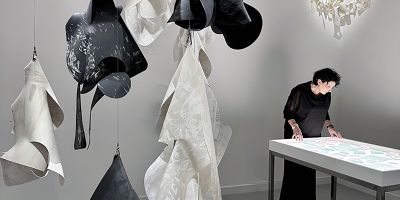Mary Barker — the first woman to study textile industries at the University of Leeds
A temporary exhibition exploring the life and work of Mary Barker, the first woman to be accepted into the textile industries course at the University of Leeds, opened this week at ULITA.
Can you imagine being the only woman or man on your university course?
1&75 — so called as Mary Barker was the only woman amongst the seventy-five men on her course when she enrolled in 1926 — has been curated by a group of MA Art Gallery and Museum Studies students from the University of Leeds. The exhibition showcases a selection of Barker’s works and explores her experiences at the university.
Mary Barker’s story begins with her love of art and creativity; from an early age she describes herself as being ‘bitten by the art bug’. She was born in 1907 and spent her early years in Somerset surrounded by nature — throughout her career, this strongly influenced her designs.
Mary grew up with a background in sciences and a passion for art, and combined these two talents on her Diploma in Textile Industries and Design course which was run jointly by the University of Leeds and Leeds School of Art. This gave her the opportunity to mix technical weaving skills and creative elements of design.
As her career progressed, her work became increasingly abstract and experimental. Upon completing her course, Barker began a successful career in industry and design and became a highly respected teacher. She taught at Brighton School of Art and lectured around the world, receiving an MBE for her services to her craft in 1992.
Mary Barker — the first woman to study textile industries at the University of Leeds
Mary Barker — the first woman to study textile industries at the University of Leeds
Being the only woman on her course at the University of Leeds presented many challenges, and these will be revealed in the exhibition through a closer look at photos and her autobiography, Tangled Threads. While she was undoubtedly treated differently for being a woman, this did not stop her from becoming a leading craftswoman and teacher.
Six MA Art Gallery and Museum Students students explored previously uncatalogued documents and items in ULITA’s archive to build up a picture of Mary Barker’s experiences and work. One such gem found in the archives was a letter written by Mary, where she writes about how on one occasion a professor asked her to leave the classroom — as the discussion that day was the breeding of sheep, a topic that would have been considered inappropriate for a woman at the time. She writes:
“One morning when he [Mary’s professor] was approaching the subject of sheep breeding, he lent over his reading desk up on the platform and said, “Miss Barker, we shan’t be needing you any more this morning, and I had to gather my books and retreat…as a country girl, I was most indignant thinking I probably knew more in practical experience of sheep breeding and lambing than the rest of them.”
MA Art Gallery and Museum Studies student, Lisa Modiano, said:
“It was fantastic to work with Mary Barker’s work first-hand and read the letters she wrote to friends and family describing her life at the university ― including the numerous times she was treated differently for being the only woman on her course.”
Jill Winder, Curator at ULITA, said:
“It was great to have the opportunity to work with students to publicise the work of this pioneering woman. The MA group’s interpretation of the work of a former student of the University of Leeds has brought a fresh approach to the research and exhibition.”




